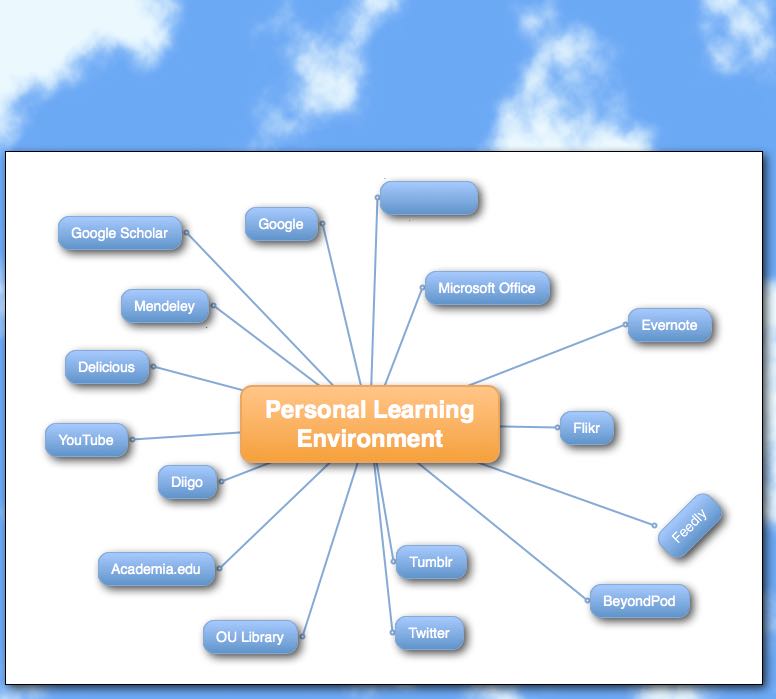
Photo: Courtesy my.opera.com

Photo: Courtesy my.opera.com

I don’t think it would be too controversial to say that the use of some kind of PLE in education is becoming more commonplace as people start to make use of technologies in various areas of their life. Where is this all heading? If we can accept that students learn in different ways and what is good for one student may not be good for another then we have to accept that a one size fits all system is not optimum either. As Weller points out in the Sclater/Weller (2016) podcast that students do not want to use an inferior system in their studies than they are using in their leisure time, they’re are some great free tools out there that work very well, but as Sclater counters that students need to be able to interact so they must be using systems that allow this, although it is a red herring to suggest that a good reason for not partaking in the use of different technologies in the form of a PLE is in case of technical failure, of course any platform can fail but if your environment is distributed then it is much less likely your whole environment is down at the same time. It is true that there needs to be some consistency for ease of communication, but at the same time students needs and preferences need to be taken into account for optimum learning potential, after all there are a vast range of technologies waiting to be exploited, along with a vast range of preferences. How would this work? Some kind of hybrid system? Maybe it is fair comment from sclater to suggest that far from the VLE being put out to pasture it could become more of a back end system. This is the direction I see for the PLE. We do need to give students ownership over the tools they use if they are to get the most out of their learning as they possibly can, but their needs to be a route for the students to maintain fluid communication. This currently does not happen with the VLE either, forums are not instant or fluid enough and the whole system is a little restrictive when compared to the tools that can be utilised in everyday life. What would be better and a potential direction is for students to choose the tools that they wish to use and have a system that interacts with these platforms giving students the flexibility of using their PLE whilst keeping the ability to communicate, of course there may be situations that need to be kept in a closed forum or at least desirable, but a more flexible system is surely more beneficial for all. Is this fanciful? Is education heading down the PLE highway? Its already on it, where to next?

As we have seen, technology has been making massive waves in recent years in education and the impact can be seen in the ways in which courses are delivered and also in the way students are interacting with their courses, this can be seen both in the class and on distance learning courses. Education itself is notoriously slow on the uptake of new technologies but of course these technologies are no longer new and the people that are innovating have grown up with these technologies. Chris Jones asks the above question in the context of an activity as part of an MA module. In my view, technology can not cause reform in itself as people need to be willing to use the technology and see the value in its use. In my opinion though it is being used as an instrument of reform, just look at the explosion of MOOCs the sheer number of courses available online now is incredible and the surge in uptake of these courses is equally phenomenal. According to class-central.com the number of students has more than doubled in the last year up from 16-18 million to over 35 million ( https://www.class-central.com/report/moocs-2015-stats/) These are obviously headline figures and the real story is a lot more nuanced than this, for example are these students that are registered to a platform, or registered to a course, have started a course, partially finished or finished a course, the permutations are endless, but it is plain to see that the interest in massive online courses is growing at a rapid rate. This is a massive subject in itself and is in danger of spinning out of control just like the MOOC figures, so to come back to the original question, I think it is reasonable to say that, yes, technology has been an instrument used to encourage reform, after all the big players in this field aren’t creating all this content out of a sense of social justice or just because they can. This is becoming a very big market as people are changing their learning habits, and see the MOOC model as one that is very flexible and one that they can jump in and out of as they see fit. People obviously have different reasons for wanting to learn but the point is that with the MOOC model, the previous barriers of large time and financial commitments have been lowered a great deal and in many cases the financial commitment has been completely removed. Society at large is changing continuously and education is and must change also.


I decided to title this blog Sporadic Blogging as this has been my experience thus far. I decided that I was going to use my Tumblr account to blog through the course of my MAODE firstly to fulfil activity obligations, but also as a bit of a journal and to organise my thoughts, to see where I was at within my thought processes at various times chronologically.
I must say number one, big tick, I have used it to fulfil obligations, but with regards to the rest, not really. Now I did post a couple of times to try to promote (unsuccessfully) my conference presentation for H818, but apart from that it was all activity based. By the way it should be noted I am fully aware that in order for a blog to be successful and therefore a good promotion tool then a following needs to be cultivated, and for a following to be cultivated then time needs to be spent and consistent postings need to be made. The unsuccessful nature of my promotion did not come as a shock, but it was more an ‘excuse’ to post. I use the word ‘excuse’ as this is how it feels to me when posting a blog, I mostly feel I need to be using my time wisely as it is something I don’t have much of at the moment. On reflection this is completely inaccurate as if I think about it there are many activities that I partake in that if I was prioritising differently I would rearrange. This is not to say they are more or less important, but just a reminder that not having time for something should be very rare as most of us can find the time to do things we would like to do if we are prepared to adjust our priorities.
This blog definitely falls into the category of fulfilling activity obligation, but it also has helped organise my thoughts as well. With regards to the activity itself I did not find any of the findings particularly surprising, however, personally the students who could see no value in studying in this way were, in my view, missing out on some important experiences. I think that the more interactions you have and the wider audience you reach, the more opportunity there is to see a point of view, or achieve some outcome or interact in a way that will help you see a particular point in a way that otherwise you would not. I have thought a lot about how I can use blogging in the future, one way that will be helpful to me, and it will mean moving my Blog at some point in the future, is for teaching purposes. I am retraining to be a secondary school teacher starting in September and I hope to incorporate blogging into my regular practice. I’m not 100% sure how this will manifest itself yet, but I’m sure the reading of my blog will be a weekly requirement, and will be a way to communicate information and start conversations to aid upcoming lessons etc. I’m aware this will be time consuming but I will be prioritising this because as Stephen Downes asserts, you must lead by example and write a blog first if you are going to require your students to do so at some point (paraphrase), and I will. You can find this paper by Stephen Downes at https://www.academia.edu/2869149/Blogs_in_Learning and for anybody that happens to be reading this, not connected to H800 the paper in this activity is Characterising the different blogging behaviours of students on online distance learning course by Kerawalla et al.
On reflection maybe I should have called this blog priorities or the illusion of time or something like that, but it wasn’t planned in any way and I just started writing and so I’m not prepared to contrive it in this way, so Sporadic Blogging is the name by which it is known.
This blog might contain posts that are only visible to logged-in users, or where only logged-in users can comment. If you have an account on the system, please log in for full access.